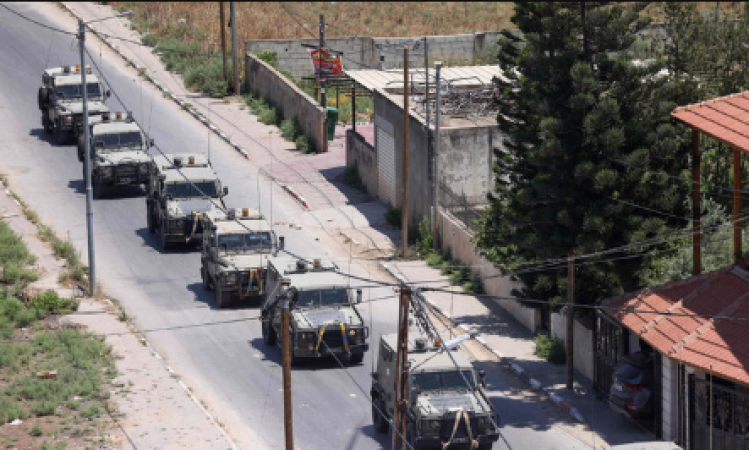
Dubai: At least to those who remember the raids and encounters of 2002 that made the Battle of Jenin a symbol of Palestinian resistance, Israel is currently conducting a massive ground offensive in a heavily populated Palestinian refugee camp in the northern West Bank.
The situation in the Occupied Palestinian Territories has largely remained unchanged despite the 21-year gap between the two Israeli military operations. In fact, with the rise of the Israeli far right to power, the slim chance of a peaceful resolution to the Middle East conflict that existed in 2002 has all but vanished.
Since Monday morning, the Israeli military has been using elite special forces, armoured personnel carriers, bulldozers, helicopters, and drones in fierce aerial bombardments and ground incursions over Jenin. A drone attack on an apartment in the middle of the camp of refugees signalled the start of the assault.
According to the Israeli military, the apartment served as a "joint operational command centre" for the Jenin Brigades, an organisation made up primarily of militants from Hamas and Islamic Jihad. Near the apparent target, which is less than half a kilometre away, are thought to live more than 10,000 Palestinians.
More than 22,000 Palestinians who were driven from their original homes in 1948 during the Nakba, or Catastrophe, when Zionist militias ethnically cleansed Palestine to establish the State of Israel, now call Jenin home. Jenin is primarily made up of camps that were initially established in the 1950s.
The enclave represents armed resistance by Palestinians against the occupation of the West Bank and Gaza. For Israelis, Jenin is a hotbed of militancy that is home to organisations with ideologies ranging from Fatah to Hamas and Islamic Jihad.
The Israeli army had used dirt mounds that its bulldozers had piled up at all of the entrances to isolate the refugee camp from the city, according to Mansour Al-Saadi, the deputy governor of Jenin, who spoke to Arab News. "The situation in Jenin camp will become a humanitarian catastrophe if the military operation lasts for a longer time," he warned.
Abdullah Amawi, a Palestinian who lives in a refugee camp in Lebanon, said to Arab News: "I have some of my relatives there. Since I can't call them, we communicate via social media. I only ever see pictures of smoke, fires, and injured people on social media. All I can do is pray for their safety, their lives, and a continuous roof to be placed on top of them.
The UN's local humanitarian coordinator, Lynn Hastings, expressed concern about the Israeli assault by writing on Twitter: "Airstrikes were used in the densely populated refugee camp. numerous fatalities and critical injuries. All injured people must have access to care.
Also Read: France's mayors hold anti-riot rallies as fewer people are being arrested
The Israeli offensive, according to a spokesperson for Mahmoud Abbas, the Palestinian president, is "a new war crime against our defenceless people," the spokesperson said. "Our Palestinian people will not kneel, will not surrender, will not raise the white flag, and will remain steadfast on their land in the face of this brutal aggression."
"The bombing of cities and camps by planes and the bulldozing of houses and roads is a collective punishment and revenge that will only lead to further detonation of the situation," said Ahmed Aboul Gheit, secretary-general of the Arab League, in remarks posted on Twitter on Monday.
The airstrikes, according to Lt. Col. Richard Hecht, a spokesman for the Israeli military, were carried out to "minimise friction" for the ground troops. According to him, 19 people living in the refugee camps were thought to be planning attacks against Israelis. He added that the operation aimed to eradicate this "safe haven mindset" in the camps.
More Israeli airstrikes have been conducted over the past 24 hours, and thousands of soldiers have been stationed in Jenin to try and seize weapons. Eight Palestinians have died and 50 have been injured thus far, according to representatives of the Palestinian Ministry of Health.
According to the Benjamin Netanyahu-led Israeli government, the offensive is "dealing a heavy blow to terrorists in Jenin." Although Israeli army radio has reported that the operation involves 1,000 soldiers and dozens of drones and could last for days, the Israeli military has not released a statement indicating when it will end.
The Jenin Brigades declared in a statement that they would fight the occupation forces "until the last breath and bullet" as the gunfight between Israeli soldiers and Palestinian fighters raged on Monday. We collaborate and are united across all military formations and factions.
A rocket was fired from the Jenin region towards an Israeli community prior to the Israeli assault, and it exploded shortly after it was fired, according to video.
After an Israeli military operation in Jenin on June 19 turned deadly, resulting in five Palestinians killed in a gunfight, including a 15-year-old Palestinian girl, tensions in the area had risen. According to Palestinian health officials, dozens more were hurt.
Also Read: China's top diplomat calls for increased collaboration with South Korea and Japan
Israel's Operation Breakwater, which was started more than a year ago, has primarily focused on Jenin and Nablus. The operation has resulted in frequent Israeli raids at night and some of the heaviest fighting in the occupied Palestinian territories since the second intifada.